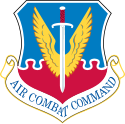Air Combat Command
| Air Combat Command | |
|---|---|

Air Combat Command Headquarters building, Langley Field, Joint Base Langley–Eustis, Virginia
|
|
| Active | 1 June 1992 – present |
| Country |
|
| Branch |
|
| Type | Major Command |
| Garrison/HQ | Langley Field, Joint Base Langley–Eustis, Virginia |
| Nickname(s) | ACC |
| Commanders | |
| Current commander |
General Herbert "Hawk" Carlisle |
| Insignia | |
| Emblem of Air Combat Command |  |
| Aircraft flown | |
| Attack | A-10 Thunderbolt II |
| Electronic warfare |
E-8 J-STARS E-3 Sentry EC-130H Compass Call |
| Fighter |
F-35A Lightning II F-22A Raptor F-16C Fighting Falcon F-15C Eagle F-15E Strike Eagle |
| Multirole helicopter | HH-60 Pave Hawk |
| Reconnaissance |
MQ-9 Reaper MQ-1 Predator RQ-170 Sentinel Lockheed U-2 Dragon Lady Boeing OC-135;RC-135S/V/W/U;TC-135;WC-135 |
| Trainer | T-38A Talon |
| Tanker | HC-130P/J Combat King |
Air Combat Command (ACC) is one of ten Major Commands (MAJCOMs) in the United States Air Force, reporting to Headquarters, United States Air Force (HAF) at the Pentagon.
ACC is headquartered at Langley Field, Joint Base Langley–Eustis (formerly Langley AFB), Virginia. Its commander is General Herbert "Hawk" Carlisle, with Major General Jerry D. Harris Jr. as Vice Commander, and Chief Master Sergeant Steve K. McDonald as the Command Chief Master Sergeant.
The mission of Air Combat Command is to be the primary force provider of non-nuclear global strike combat aircraft to America's warfighting commands, the geographic Unified Combatant Commands, specifically to the United States European Command, United States Pacific Command, United States Central Command, United States Southern Command, United States Northern Command, and United States Africa Command. ACC organizes, trains, equips and maintains combat-ready units for rapid deployment abroad while also ensuring strategic air defense of the United States is strong enough for both peacetime and wartime needs. In addition, ACC augments the forces of the United States European Command, United States Pacific Command and United States Central Command when needed.
...
Wikipedia
